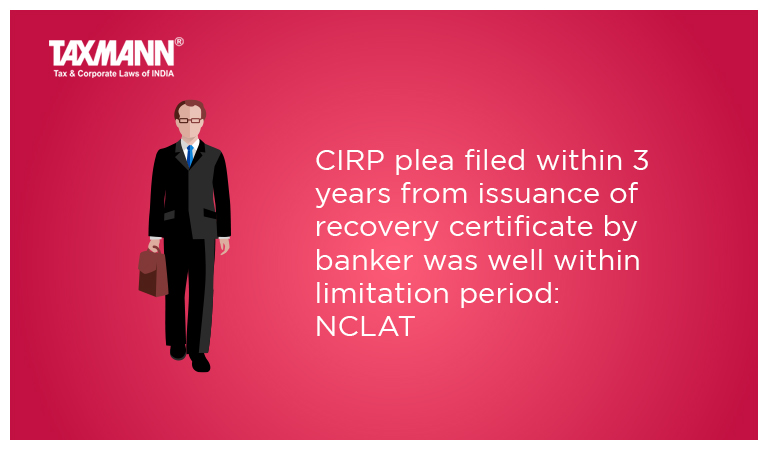CIRP plea filed within 3 years from issuance of recovery certificate by banker was well within limitation period: NCLAT
- Blog|News|Insolvency and Bankruptcy Code|
- 3 Min Read
- By Taxmann
- |
- Last Updated on 25 August, 2022

Case Details: Canara Bank v. R.S. Builtwell (P.) Ltd. - [2022] 141 taxmann.com 135 (NCLAT-New Delhi)
Judiciary and Counsel Details
-
- Anant Bijay Singh, Judicial Member & Ms Shreesha Merla, Technical Member
- Hitesh Sachar, Adv. for the Appellant.
- Kumar Mihir, AOR SCI, Ms. Gunjan Sharma & Anuj Prakash, Advs. for the Respondent.
Facts of the Case
In the instant case, the appellant preferred an appeal against the impugned order passed by the Adjudicating Authority (NCLT) whereby the application filed u/s 7 of the IBC was dismissed on the ground that it was barred by limitation.
The appellant-financial creditor granted a loan to the corporate debtor. The account of the corporate debtor was declared as Non-performing Assets (NPA) on 5.04.2008. The appellant filed an application before DRT and received a recovery certificate dated 02.07.2019 against the corporate debtor.
However, the corporate debtor failed to make payment in compliance of the said order of the Debt Recovery Tribunal (DRT). Thereafter, the appellant filed an application u/s 7 of the IBC against the corporate debtor for initiation of CIRP on 18.11.2019.
The National Company Law Tribunal (NCLT) by impugned order dismissed the said application holding that if a period of limitation was calculated from the date of NPA i.e, 05.04.2008, then the instant application was filed much after a period of limitation and, hence, the said application was barred by limitation.
Thereafter, an appeal was made to the National Company Law Appellate Tribunal (NCLAT) against the order passed by the National Company Law Tribunal (NCLT).
The appellant submitted that the period of Limitation began ticking from the date of issuance of the Recovery Certificate, which was issued by the DRT on 07.02.2021 and the application filed on 18.11.2019, was well within the limitation period of three years.
Further, the appellant submitted that the account was declared as NPA on 05.04.2008, however the same was restructured on various occasions within the period of three years, which automatically extends the Limitation to the ‘date of acknowledgement’, of the OTS
NCLAT Held
The NCLAT held that since the application under section 7 of the IBC was filed by the appellant within a period of three years from the date of issuance of the recovery certificate, the same was well within the limitation period. Therefore, the impugned order passed by the NCLT was to be set aside.
List of Cases Reviewed
-
- Canara Bank (Earstwhile Syndicate Bank) v. R.S Builtwell (P.) Ltd. [CP (IB) No. 3005 (ND) of 2019 (NCLT – New Delhi), dated 25-2-2021] (para 7) reversed.
- Dena Bank v. C. Shivakumar Reddy [2021] 129 taxmann.com 60 (SC) (para 4) followed.
List of Cases Referred to
-
- Ishrat Ali v. Cosmos Co-operative Bank Ltd. [2020] 120 taxmann.com 288/162 SCL 549 (NCLAT – New Delhi) (para 1)
- Vashdeo R. Bhojwani v. Abhyudaya Co-operative Bank Ltd. [2019] 109 taxmann.com 198/156 SCL 539 (SC) (para 2)
- Ugro Capital Ltd. v. Bangalore Dehydration and Drying Equipment Co. (P.) Ltd. (BDDE) [2020] 115 taxmann.com 362 (NCLAT – New Delhi) (para 2)
- Sesh Nath Singh v. Baidyabati Sheoraphuli Co-operative Bank Ltd. [2020] 114 taxmann.com 282/158 SCL 211 (NCLAT – New Delhi) (para 2)
- Sesh Nath Singh v. Baidyabati Sheoraphuli Co-operative Bank Ltd. [2021] 125 taxmann.com 357/166 SCL 507 (SC) (para 2)
- MM. Ramachandran v. South Indian Bank Ltd. [Company Appeal (AT) (Insolvency) No. 1509 of 2019, dated 22-1-2020] (para 2)
- MM. Ramachandran v. South Indian Bank Ltd. [Civil Appeal No. 2951 of 2020, dated 17-11-2020] (para 2)
- Asset Reconstruction Co. (India) Ltd. v. Bishal Jaiswal [2021] 126 taxmann.com 200/166 SCL 82 (para 4)
- Dena Bank v. C. Shivakumar Reddy [2021] 129 taxmann.com 60 (SC) (para 4).
Disclaimer: The content/information published on the website is only for general information of the user and shall not be construed as legal advice. While the Taxmann has exercised reasonable efforts to ensure the veracity of information/content published, Taxmann shall be under no liability in any manner whatsoever for incorrect information, if any.

Taxmann Publications has a dedicated in-house Research & Editorial Team. This team consists of a team of Chartered Accountants, Company Secretaries, and Lawyers. This team works under the guidance and supervision of editor-in-chief Mr Rakesh Bhargava.
The Research and Editorial Team is responsible for developing reliable and accurate content for the readers. The team follows the six-sigma approach to achieve the benchmark of zero error in its publications and research platforms. The team ensures that the following publication guidelines are thoroughly followed while developing the content:
- The statutory material is obtained only from the authorized and reliable sources
- All the latest developments in the judicial and legislative fields are covered
- Prepare the analytical write-ups on current, controversial, and important issues to help the readers to understand the concept and its implications
- Every content published by Taxmann is complete, accurate and lucid
- All evidence-based statements are supported with proper reference to Section, Circular No., Notification No. or citations
- The golden rules of grammar, style and consistency are thoroughly followed
- Font and size that’s easy to read and remain consistent across all imprint and digital publications are applied



 CA | CS | CMA
CA | CS | CMA
